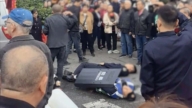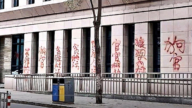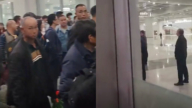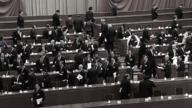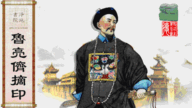【新唐人2014年05月08日讯】最近,大陆媒体曝光了一起发生在四个月前的网络警察受贿案。海南海口市的一名网警大队长,利用监控网络舆情的工作便利,先后数百次为外地网警删除当地政府机关和官员的“负面帖子”,收受贿款近百万元。案件曝光后,引发了外界对大陆舆论监控的关注。同时,网警受贿进行“有偿删贴”究竟是个人行为,还是背后有更大的黑手?也引发了舆论质疑。
据大陆媒体报导,原海口市公安局网警支队一大队副大队长魏一宁因为受贿,在去年12月20号被海口市龙华区法院一审判处有期徒刑10年。令人吃惊的是,案件中行贿者竟然是来自全国6个省11个地市公安机关的11名网警。
报导中说,11名网警贿赂1名海口网警,办的全是“公事”,基本上都是关于各地方政府和官员不希望被看到的信息。它们以“维护政府形象”为借口,找到魏一宁帮忙“有偿删贴”。
几年来,11名网警共计向魏一宁行贿高达70多万元。其中,行贿最多的是来自湖北黄冈市公安局的网警彭某,他在短短一年的时间里,向魏一宁行贿148次,共48万多元。
前大陆《百姓》杂志主编黄良天:“像这种事情每天都在发生着,我们在中国媒体界或者报界有个行话,叫做‘有偿不新闻’。就是我给你报出本来很有新闻价值的东西,老百姓也喜欢看,但是对当事人士途上有影响,那么你‘有偿’,我就不新闻了。这个很普遍的一个现象,不但那些网警,报社的社长、媒体也干这事儿啊!来公关一下,我就不给你报了。”
为何外地网警要向海口市网警副队长行贿?据了解,中国最具影响力、最受弱势群体欢迎的两大论坛——《天涯社区》和《凯迪论坛》的总部,都设在海口。海口市网警对这两个论坛的网帖拥有舆情监督、情报收集和信息处置权。对于网站来说,网警就是它们的顶头上司,只要网警一个指令,哪怕是随便找个理由,网站有再多的不满和质疑也不敢多问,删帖令最多在十分钟之内就得执行。
有证据显示,魏一宁利用海口市公安局网警的公共账号,向《天涯》、《凯迪》发送“处置指令”,完成了280多次“有偿删帖”。
虽然这起利用舆论监控权受贿的腐败案,最终结果是行贿的网警被曝光,受贿的网警被判刑,双方都罪有应得。但有媒体评论指出,行、受贿的网警其实都是“替罪羊”。
评论质问,对于行贿方来说,那些动辄数十万的“删帖费”是谁出的,到底是哪些官员不愿意看到“负面信息”,他们在非法删帖中扮演了什么角色?为何没有追究这些官员的相关责任?这些问题,都值得深思。
另一方面,很多人将责任归咎于假公济私的执法网警、不负责任的网站管理人员以及以权谋私的喉舌媒体机构,却忽略了作为媒体监管者的宣传部门,才是真正的后台老板。
黄良天:“它有的钱就直接送到(宣传)主管部门,主管部门给你打电话,它拿到钱就直接命令你不能登(报),你就登不出来。”
大陆《泡泡网》的评论指出,在舆论监控这块美味的大蛋糕中,网警分到的只是很小的一点,大部分利益属于宣传部门。因为宣传部门的权力有两个特点:一是不受制约,二是黑幕化。哪怕是中共组织内部,也几乎没有任何机制来对它制约和修正。
黄良天:“它(中共)那个所有的禁令都是有来头的,或者保护一些国家机密的权力,或者哪个党和国家领导人的权力、微信什么之类的禁令。那更多的是利益,我当《百姓》总编辑的时候,就经常接到中宣部电话,后来我就问它们(中宣部),我说你是不是收他们钱了?我没登你怎么知道我要登?而且还保护到县一级。0634对方就挂电话了,就怕了。”
大陆资深媒体人,前《百姓》杂志主编黄良天指出,网警受贿案之所以能被曝光,有可能是负责“删贴”的网警与背后的宣传部门分赃不清造成的。
采访编辑/张天宇 后制/李勇
Internet Police Bribe or Publicity Organ Division of Spoils?
A bribery case involving Internet police four months ago was
recently revealed.
An Internet policeman of Haikou City, Hainan Province, received
bribes of nearly one million yuan for deleting hundreds of
posts negative to the image of local governments.
Was the bribery due to personal misconduct?
Could there be pushing hands behind the bribery?
The following is some of the public opinion.
Wei Yining was a former Internet police captain of Haikou
Municipal Public Security Bureau.
He was sentenced to 10 years imprisonment last Dec. 20 for
bribery.
What was surprising about the bribery case was that, involved
in the case were 11 bribers, also Internet police from 11 public
security bureaus of six provinces.
Chinese media reported that the 11 police had bribed the
Haikou police on “official" business, i.e., to delete unwelcome
information for local governments and officials.
In the name of “maintaining the image of government" they
paid Wei Yining to do the job.
These 11 Internet police had paid Wei a total of 700,000
yuan in a year of work.
An Internet policeman, in particular from Huanggan City of Hubei
had bribed Wei 148 times with a total pay of 480,000 yuan
within a year.
Huang Liangtian, former editor of Baixing Magazine: It
happens all the time.
In China, there is a slogan in the media industry, “paid, no news".
That means, a piece of news could be very worthwhile to the
public but affect the career of the entity.
So, if you pay, then there’ll be no news. This is very common.
it’s not just the Internet police, newspapers and media would
do the same.
Do some public relations, then there’ll be no report."
Why are Haikou City police in particular bribed? It is known
that the most influential social media on behalf of the most
vulnerable groups, www.tianya.cn and club.kdnet.net, are
located in Haikou.
The Internet police at Haikou are in charge of monitoring,
intelligence gathering and information disposition of these
two Web sites.
Under Haikou police instruction, posts will be deleted in
10 minutes with no questions asked.
Evidence showed that Wei Yining had used the Haikou
Municipal Public Security account to complete 280 “paid"
deletions at both Web sites.
Although the Internet police involved in the bribery case were
exposed and sentenced for manipulating censorship, some
media commented that the police were just the “scapegoats."
Comments asked who paid for the tens of thousands of
“deletion fees"?
Who were the officials that don"t want to see the “negative" posts?
What were their roles in the illegal deletion of the Internet posts?
Why weren"t they being held responsible?
While blaming the Internet police and the Web site managers
for abusing their authority, many people also pointed out
that the Publicity Department, the media regulator, is the real
culprit behind the case.
Huang Liangtian: “Sometimes the money was directly sent to
the Publicity authorities, who will just call and instruct not to
publish, then that was it."
A commentary from www.PCPOP.com indicated that in the big
pie of censorship, Internet police only share a small piece.
The majority of it went to the Publicity organ, which has two
specific authorities: One is that it’s not restricted, and the
other is that it’s hidden.
Any internal organ of the CCP has no control or mechanism
against it.
Huang Liangtian: All of the orders to delete came from some
authority or (another), in the name of state secrets, the security of the
Party or the leadership.
The majority of them were for the sake of personal interest.
When I was the chief editor of Baixing Magazine, I often
received phone calls from the Publicity Department.
One time I asked if they had taken bribes. How do you
know what I would publish?
That scared them, so they just hung up.
Former chief editor of Baixing Magazine, Huang Liangtian
analyzes that exposure of the Internet police bribery case was
very likely due to the unclear division of spoils between the
Internet police and the Publicity Department.
Interview & Edit/zhang tian yu Post-Production/Li Yong


